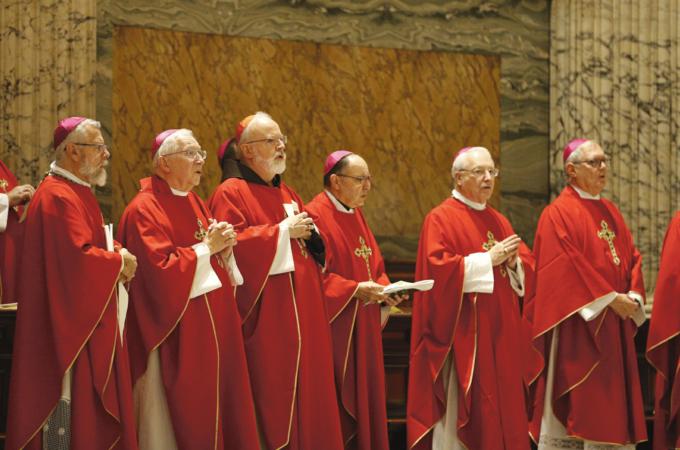New England bishops in Rome for 'ad limina' visit
ROME (CNS) -- The bishops of Massachusetts, Rhode Island, Connecticut, New Hampshire, Maine, and Vermont were in Rome Nov. 4-8 for their visits "ad limina apostolorum" -- to the threshold of the apostles.
The New England group was the first of 15 regional groups of U.S. bishops to make their visits to Rome and the Vatican in 2019-2020. The U.S. bishops' previous ad limina visits were eight years ago -- in 2011-2012.
Their trip was to include numerous meetings at Vatican offices and with the pope, to report on their dioceses and to be strengthened in their mission as successors of the apostles. But the "Directory for the 'Ad Limina' Visit" makes clear that the ad liminas are a pilgrimage first of all.
The purpose of the bishop's pilgrimage, the directory states, is "the strengthening of their own responsibility as successors of the Apostles and of their hierarchical communion with the Successor of Peter. The point of reference is a visit to the tombs of Sts. Peter and Paul, pastors and pillars of the Roman Church."
On the first day of their pilgrimage, the New England bishops celebrated Mass in the chapel of St. Mary Major, the Rome basilica that houses the Marian icon "Salus Populi Romani" (health of the Roman people).
Archbishop Leonard P. Blair of Hartford, Connecticut, said in his homily that at times of great crisis in the Catholic Church, God intervened to renew it through the example and witness of saints.
"We feel very keenly today, all of us, the weight of human sinfulness, of infidelity, of scandal, of the sin that weighs down the Church," he said.
Archbishop Blair reflected on the day's memorial of St. Charles Borromeo and read a description of the saint by Bishop Antonio Seneca of Anagni, Italy, who had lived in the same house with him.
St. Charles, the archbishop read, was "vigilant in rooting out vice, benevolent in correction, just in judgment, loving in punishment, patient of human weakness, quick to avenge disobedience, his justice was united with kindness, his severity with gentleness and peace. He was a diligent guardian of wholesome discipline both in priests and people."
Archbishop Blair said that the Italian bishop's description of the saint "took place in a Church that had seemed to be failing, really failing."
Recalling his years working at the Vatican Secretariat of State -- from 1994 to 1997 -- Archbishop Blair noted that the English section is located in an area known as the Borgia tower, where among the rooms is the apartment of Giovanni Borgia, the murdered son of Pope Alexander VI.
When the sins of those called to lead the Church became more widely known, Archbishop Blair said, "it was a time of utter pain for the Church and one might wonder how the Church would ever get itself out of such a mess."
Yet, decades after the death of the pope's son, St. Charles Borromeo "inhabited that very same room," he said. "The plea of God's people -- that the Church be constantly renewed, and (that) by conforming itself to the likeness of Christ may show his face to the world -- that prayer was answered."
The next day, the bishops from New England gathered in the Basilica of St. Paul Outside the Walls to celebrate Mass and pray at the apostle's tomb.
In his homily, Bishop Robert P. Deeley of Portland, Maine, noted how St. Paul developed a sort of "theology of Jesus" in his Letter to the Romans.
The apostle reminded his listeners "that faith in Jesus is not just a set of propositions," but is an encounter and a relationship that radically changes people's lives, the bishop said.
Just as the first disciples were changed by their encounter with the Lord, "faith changes us," he said. "We are called to recognize our oneness in Christ" and God's generosity.
Recognizing that shared experience builds unity as does using one's gifts for the good of each other, he said, reflecting on Romans 12:5-16, which begins, "We, though many, are one body in Christ and individually parts of one another."
Bishop Deeley said that as bishops they also must recognize the gifts among the people they serve and see how they can help further the Church's mission and build up the people of God.
He asked that their pilgrimage and prayers at "these holy places" and their talks with Pope Francis would "strengthen us in our ministry."
"It is a pilgrimage we do together, and it reminds us that we rely" on one another, he added.
The bishops, wearing bright red vestments, prayed at the tomb of St. Paul after concelebrating Mass.
For Boston auxiliary Bishop Mark O'Connell this was his first ad limina visit to Rome.
He was interviewed by Vatican radio after the bishops had held some meetings at several offices of the Roman Curia.
What has stood out for him, he said, was that "we were not lectured to. We had a conversation."
"I've already got a lot out of this ad limina visit," he told Vatican Radio.
As for meeting with Pope Francis, Bishop O'Connell said he was looking forward to participating in "a substantial conversation with 19 bishops and the pope."
It will be "fascinating just to be in the room," he said.



















